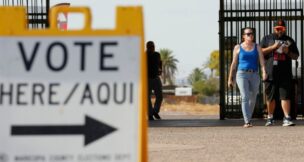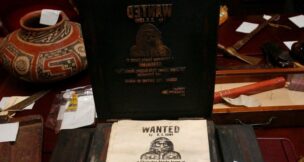Congratulations to our 2013 ‘Leaders of the Year’
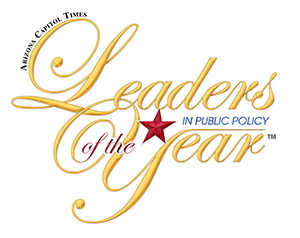 More than 250 attendees packed a ballroom at The Phoenician the evening of Sept. 24 to honor the 2013 Arizona Capitol Times Leaders of the Year in Public Policy, now in its seventh year. Guests enjoyed a festive reception before the awards presentation.
More than 250 attendees packed a ballroom at The Phoenician the evening of Sept. 24 to honor the 2013 Arizona Capitol Times Leaders of the Year in Public Policy, now in its seventh year. Guests enjoyed a festive reception before the awards presentation.
A quick survey of the room revealed that leaders are found everywhere across the Grand Canyon State, from all sectors and of all political stripes. Leaders of the Year seeks to recognize those individuals and entities who drive positive change in public policy.
“From streamlining the state’s tax code to volunteering to serve a meal to one hungry person, Leaders of the Year recognizes Arizonans who make a positive difference and provide leadership at every level,” said Arizona News Service/Arizona Capitol Times Vice President and Publisher Ginger Lamb. “There are a lot of people working tirelessly to make Arizona the best it can be.”
At the event, Arizona News Service also awarded its inaugural scholarship to a public policy student. The scholarship was created to give back to public policy and journalism by helping to nurture future leaders in both sectors that are critical to the success of ANS and all of its products and services.
A record 20 recipients were chosen this year by the selection committee, with honors being bestowed in categories such as education, economic development, health care and technology. Michael Hunter, a policy adviser in the Governor’s Office, was recognized as an “Up & Comer” a new category for 2013. His boss, Gov. Jan Brewer, was recognized as the Leader of the Year in the economic development category, and was selected by the other honorees as the overall Leader of the Year.
Congratulations to the 2013 Leaders of the Year.
Josh Coddington
Special Publications Editor
— Profiles written and edited by Josh Coddington.
ANS Public Policy Scholarship Recipient
Jennifer Papworth
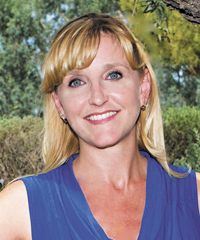 In March 2010, Jennifer Papworth traveled to Washington, D.C., to tell members of Arizona’s congressional delegation why it was important they support the children of illegal aliens under the DREAM Act.
In March 2010, Jennifer Papworth traveled to Washington, D.C., to tell members of Arizona’s congressional delegation why it was important they support the children of illegal aliens under the DREAM Act.
They are seeking “a pathway to citizenship in a country they always felt like they belong to anyway,” Papworth said.
At the time she wasn’t a politician, a lobbyist, a political consultant or an activist. She was a student in Maricopa Community Colleges’ Center for Civic Participation (MCCCCP) whose job was to study an issue and advocate for it to those who make decisions on public policy.
“It encouraged me to go beyond the two-year degree,” she says, adding, “I realized how our lives are affected by public policy.”
As a result, Papworth decided to attend Arizona State University, where she is a senior working toward a bachelor’s of science in public policy. She attended Rio Salado College from 2008-2012 where she earned her associate’s degree in public administration, graduating with honors. At ASU she has a 4.0 grade point average.
Papworth was chosen as the inaugural winner of the $1,000 Arizona News Service Scholarship given to exceptional students studying public policy.
“Jennifer is a remarkable young woman who will no doubt be someone we will see at the Capitol in the future,” says Arizona News Service/Arizona Capitol Times Vice President and Publisher Ginger Lamb. “She was chosen for our inaugural public policy scholarship for her academic excellence, her extracurricular activities and overall interest in pursuing a career in public policy.”
The purpose of the scholarship is to encourage students to study public policy for the purpose of creating a better society for the future. Those who have watched Papworth grow through her college career say she is an excellent choice.
Alberto Olivas, director of MCCCCP, says Papworth was an exceptional student who brought thoughtful, intelligent discussion to the issues.
“Jennifer is unique in many ways,” Olivas says, partly because she was raising a family while attending school and volunteering on different community boards dealing with education. “She came to the table with a high degree of competence with public policy issues.”
Professor Joe Matthews of ASU’s School of Public Affairs wrote in a recommendation for the scholarship that Papworth “has a ton of promise as journalist, writer and public intellectual.”
Papworth says that although she has a passion for researching and debating public policy, she is unlikely be a candidate for public office. “I do not see myself running for office. Policy and strategy campaigning drive me insane,” she says.
Papworth works as a government relations intern for the Maricopa Community College District where she is involved in public policy research and discussions. She has also served on several education-related public boards and in organizations since 2002.
“It’s a lot of work, but I love it,” she says.
While she acknowledges that public policy can become dry at times, she gets excited about translating “the legalese into something that is common sense, making it as simple as possible. I try, and the less I understand, the more I try to learn about it to explain it to other people,” she says.
As part of her public policy studies, Papworth investigated why more people don’t vote, coming to the conclusion that opening up Arizona’s primary system to candidates not connected with the two major parties might encourage more people to vote.
“It might help. It would attract more people who are thoughtful on the issues instead of the small group of people who do elect them,” she says.
Although she doesn’t want to run for public office, she is intrigued by the legislative process and figures the experience will help her no matter where she ends up.
“I would really like to work in the Legislature for a couple years. I would really like to get some public policy and relationship building experience,” she adds.
— Written by Paul Dagostino
Arts & Humanities
Sen. Steve Farley, Arizona State Senate, D-Tucson
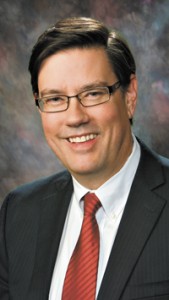 Sen. Steve Farley has been working in art for 28 years — more than twice as long as he has been involved in politics — 12 years. However, he brought his passion for the arts with him to the Capitol, and has used it to drive him to secure $1 million in funding this year for Arizona Commission on the Arts projects. He believes that “true societal breakthroughs” come from the right, or creative, side of the brain, and says that it should be nurtured along with the left, or logical, side.
Sen. Steve Farley has been working in art for 28 years — more than twice as long as he has been involved in politics — 12 years. However, he brought his passion for the arts with him to the Capitol, and has used it to drive him to secure $1 million in funding this year for Arizona Commission on the Arts projects. He believes that “true societal breakthroughs” come from the right, or creative, side of the brain, and says that it should be nurtured along with the left, or logical, side.
What is your most notable accomplishment in public policy this year?
Working across the aisle with Republican leaders to allocate — from the interest generated by the Rainy Day Fund — $1 million for State Parks capital projects and $1 million for Arts Commission project grants so that that money can be put to work all over the state, creating jobs, boosting the economy, and preserving our culture and heritage. This was the first increase in funding for the arts in five years.
What is your top goal for the next 12 months?
Sustaining that level of funding for arts and parks and increasing it to $2 million each to create even more benefits for the most entrepreneurial sector of our economy.
What one quality can be the difference between success and failure as a leader?
The ability to listen, discern, and act when the conditions are ripe, and not act when they aren’t.
What would Arizona miss most if you moved to another state?
Sorry, it’s the other way around. I would miss the people, culture and landscape of Arizona more than Arizona would miss me!
If the Legislature could grant you one request, what would it be?
Allow each legislator to designate at least one bill of his or her choosing which must proceed to an up or down vote on the floor.
Who has had the biggest impact on your development as a leader?
My high school English teacher Larry McMillin.
How did you get started as an artist?
I started taking photos with a Kodak Instamatic camera in first grade and never looked back.
Which of your public arts projects are you most proud of and why?
The Gabe Zimmerman Memorial Trailhead, which I did free of charge to honor Gabby Giffords’ staffer who was killed on Jan. 8, 2011, means the most to me since Gabe was a friend of mine and a friend to all Tucsonans, and we all miss him so much. The 4,000-sq. ft. Broadway Underpass murals at the eastern gateway to Downtown Tucson are also special since they were the project for which I invented my tile process Tilography, and for more than 15 years they have been embraced by the entire Tucson community as a mirror to our soul.
Business
Kevin McCarthy, Executive Director, Arizona Tax Research Association
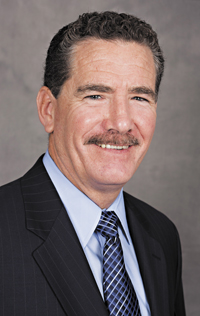 Kevin McCarthy is quick to deflect any praise he receives, giving credit for accomplishments to his staff at the Arizona Tax Research Association. ATRA played a major role this session in helping pass one of Gov. Jan Brewer’s top priorities, reforming the state’s transaction privilege tax (TPT) statutes. The bill, which streamlines the state’s multi-layer sales tax system for businesses operating in multiple municipalities, took a lot of work from several entities, lawmakers and the governor. Upon its signing, Brewer said the law will allow small businesses to spend less time on paperwork and more time creating jobs.
Kevin McCarthy is quick to deflect any praise he receives, giving credit for accomplishments to his staff at the Arizona Tax Research Association. ATRA played a major role this session in helping pass one of Gov. Jan Brewer’s top priorities, reforming the state’s transaction privilege tax (TPT) statutes. The bill, which streamlines the state’s multi-layer sales tax system for businesses operating in multiple municipalities, took a lot of work from several entities, lawmakers and the governor. Upon its signing, Brewer said the law will allow small businesses to spend less time on paperwork and more time creating jobs.
What is your most notable accomplishment in public policy this year?
ATRA had an outstanding year at the Legislature in 2013. Clearly, ATRA’s most notable accomplishment is the role our staff played, along with the entire business community, in working with the Legislature and Gov. Brewer to pass TPT reform.
What is your top goal for the next 12 months?
The implementation of the TPT reforms, as well as continued sales tax reforms necessary for compliance with the Marketplace Fairness Act. ATRA is also poised to play a key role in reforming Arizona’s school finance system.
What one quality can be the difference between success and failure as a leader?
Certainly there are many, but in the legislative arena I think it is working on substantive issues without a fear of failure.
How long have you been working in this field?
ATRA is very proud of its experienced Board of Directors and staff. Many board members have served for decades – some over 30 years. I am in my 27th year at ATRA. ATRA Vice President Jennifer Stielow is in her 13th year.
What would Arizona miss most if you moved to another state?
I’m not sure I would be missed at all, but there would probably be a fair number of state and local officials that would throw a party.
Who has had the biggest impact on your development as a leader?
Until he passed away a few years ago, my mentor was my older brother Larry, who was the president of the California Taxpayers Association.
What was the biggest obstacle to passing TPT reform this year?
Arizona’s TPT system is a mess largely because of the independent municipal system. That system survived for decades because calls for tax reform were always outweighed by lawmakers supporting city arguments for local control.
What impact will the average Arizona resident feel from TPT reform?
The reason why TPT reform has been so difficult is that it is a tax issue that only affects business. Arizona citizens that pay sales taxes weren’t impacted by the enormous administrative burdens associated with the compliance issues the legislation addressed. However, the wasteful costs associated with the current system kill jobs and impede economic development. To that end, tax simplification and job growth will be good for all Arizonans.
Economic Development
Governor Janice K. Brewer
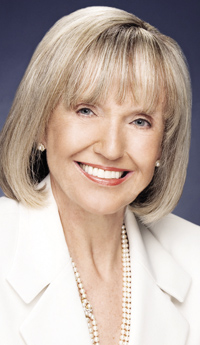 Gov. Jan Brewer, who has served Arizonans as an elected official since 1982, had a very successful 2013 in getting two of her top priorities, Medicaid restoration and sales tax simplification, passed through the Legislature and signed into law. Although she says inquiring minds will have to wait until her 2014 State of the State speech to find out her specific priorities for next year, she says the plan is to build on her current successes.
Gov. Jan Brewer, who has served Arizonans as an elected official since 1982, had a very successful 2013 in getting two of her top priorities, Medicaid restoration and sales tax simplification, passed through the Legislature and signed into law. Although she says inquiring minds will have to wait until her 2014 State of the State speech to find out her specific priorities for next year, she says the plan is to build on her current successes.
What is your most notable accomplishment in public policy this year?
Our historic success in both Medicaid restoration and sales tax simplification continued our multi-year strategy toward a structurally balanced budget and lengthened our stride on the trail we blazed toward the great Arizona comeback.
What is your top goal for the next 12 months?
Sorry, but you’ll just have to stay tuned for my State of the State address in January to learn more of my focus in 2014. Naturally though, I want to build on our success and ensure that our tremendous accomplishments in education, state government reform, economic development, transparent and realistic budgeting, and renewed federalism are not undermined.
What one quality can be the difference between success and failure as a leader?
I’ve always believed above all else that “your word is your bond,” and throughout my career I’ve built a reputation as someone who delivers on what they promise. A good leader will stick to their convictions and do what is right, even when it is difficult.
What would Arizona miss most if you moved to another state?
Scorpions would run rampant.
If the Legislature could grant you one request, what would it be?
I would have suggested it become a unicameral legislature, but I can’t decide which of the two chambers to keep. In truth, the Legislature has delivered on many of my highest priorities, and I remain confident that together we can finish the work already accomplished in leading Arizona out of the budget calamity and economic challenges that I inherited when becoming governor in January 2009.
Who do you trust most for advice?
My husband.
Who has had the biggest impact on your development as a leader?
My mother.
If you could tweet one bit of advice to Arizonans, what would it be? (in 140 characters or less.)
Your voice is your vote.
How will Arizona’s economy be different ten years from now because of Medicaid expansion?
Medicaid restoration, you meant to say. Arizona has voted twice to provide a health care safety net for our most vulnerable citizens. Through AHCCCS and my Medicaid restoration plan, we accomplished restoration in the most cost-effective, economically beneficial way possible for Arizona. In ten years, Arizona’s economy will be stronger, and every state will have followed Arizona’s gold standard AHCCCS model — at least the smart ones.
Education
Dr. Amanda Burke, Director of Education Strategy and Innovation, Center for the Future of Arizona
 Amanda Burke, who has worked in education for 12 years, is being recognized as a 2013 Leader of the Year in Public Policy for her work at The Center for the Future of Arizona on education issues. One of her major accomplishments is the Move On When Ready initiative, designed to increase academic achievement and prepare all students for college and careers. The initiative provides students multiple, adaptive education pathways and moves away from a “one-size-fits-all,” time-in-a-classroom-chair approach. More than 30 Arizona high schools are voluntarily implementing Move On When Ready.
Amanda Burke, who has worked in education for 12 years, is being recognized as a 2013 Leader of the Year in Public Policy for her work at The Center for the Future of Arizona on education issues. One of her major accomplishments is the Move On When Ready initiative, designed to increase academic achievement and prepare all students for college and careers. The initiative provides students multiple, adaptive education pathways and moves away from a “one-size-fits-all,” time-in-a-classroom-chair approach. More than 30 Arizona high schools are voluntarily implementing Move On When Ready.
What is your most notable accomplishment in public policy this year?
Directly supporting Arizona’s statewide education goals through the advancement and demonstration of the Move On When Ready initiative.
What is your top goal for the next 12 months?
Demonstrating at scale a working model for personalized, competency-based education directly tied to college and career readiness. The Move On When Ready legislation put Arizona on the map as a leader in performance-based education. Arizona is at the leading edge of implementing new higher academic standards and showing how to actually put in place a student-centered, customized learning model that prepares each student for success in college and career.
What one quality can be the difference between success and failure as a leader?
The ability to embrace change.
What would Arizona miss most if you moved to another state?
My passion and commitment to take innovative ideas that have the potential to change the way the whole of public education is done and put them into action through collaborative work with policymakers and educators.
Arizona would also miss the opportunity to meet my son — my husband and I are expecting our first child this October!
If the Legislature could grant you one request, what would it be?
Create conditions in which innovation in education can thrive by aligning policies around student learning, providing flexibility in funding, and committing to giving schools the time needed to implement and evaluate innovation based on high expectations and measurable outcomes.
Who has had the biggest impact on your development as a leader?
I’m fortunate to work at the Center for the Future of Arizona with two incredible individuals, Dr. Lattie Coor and Dr. Sybil Francis, who both have had a significant impact on my development as a leader.
The Center describes itself as a “do tank” as opposed to merely a “think tank.” Give one example of what this means.
The Beat the Odds Institute is a great example. The Center’s 2006 research study “Why Some Schools with Latino Children Beat the Odds . . . and Others Don’t,” revealed keys to success in 12 schools where student achievement was better than expected when compared with more than 330 similar schools. In 2007, the Center created the Beat the Odds Institute to put the research findings into action. Through the Institute, the Center today trains Arizona K-12 principals from more than 80 schools to apply the lessons learned for success on their campuses.
Government
Councilman Sal DiCiccio, District 6, City of Phoenix
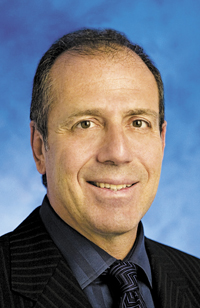 Phoenix City Councilman Sal DiCiccio is in his second stint on the council, after first being elected to the job in 1994, and re-elected in 1998. In 2009, he was appointed to fill a vacated council seat, and easily won re-election this year, topping his challenger by 9 percentage points. DiCiccio says he is getting closer to achieving his overall goal of creating a “new sustainable government model” based on four pillars that tie government to the economy and make it operate more efficiently.
Phoenix City Councilman Sal DiCiccio is in his second stint on the council, after first being elected to the job in 1994, and re-elected in 1998. In 2009, he was appointed to fill a vacated council seat, and easily won re-election this year, topping his challenger by 9 percentage points. DiCiccio says he is getting closer to achieving his overall goal of creating a “new sustainable government model” based on four pillars that tie government to the economy and make it operate more efficiently.
What is your most notable accomplishment in the public policy this year?
I’m getting closer to the overall goal of creating a new sustainable government model. The new model has four pillars that tie government to the economy and makes it operate more efficiently (elastic). The pillars are: Short term operational fixes – limiting revenue, eliminating the food tax, no increases in city fees, water/sewer rates or property taxes; Long term debt fixes – tackling long term-debt (pension liabilities) that cause cities to go bankrupt; Job creation fixes – cutting red tape, streamlining and privatization of business permits; and Structural fixes – shifting to a zero-based budget and creating a pay-for-performance model.
What is your top goal for the next 12 months?
Real pension reform with three objectives: Fixing unfunded pension debt; Moving from a defined benefit to defined contribution model; and ending pension spiking.
What one quality can be the difference between success and failure as a leader?
Persistence and keeping your eye on the ball. You should finish the goals you start and focus on what’s in front of you.
How long have you been working in this field?
I was a councilman in the mid- to late-‘90s and was re-elected in 2009.
What would Arizona miss most if you moved to another state?
I know the unions wouldn’t miss me.
If the Legislature could grant you one request, what would it be?
Set the stage for true competition. Provide open markets in which business can freely compete.
Who do you trust most for advice?
My wife Debbie and friend Max Fose. They are both incredibly smart and talented people. Max thinks I should listen to my wife more, and my wife agrees with Max.
Who has had the biggest impact on your development as a leader?
My mother and father. They were immigrants and we grew up poor. They taught me the value of hard work, dedication and fairness.
If you could tweet one bit of advice to Arizonans, what would it be? (in 140 characters or less.)
Take care of your family. They are your legacy and will be the only ones at your bedside when we leave this earth.
You won re-election by about 9 percentage points. What part of your platform has the biggest impact on the District 6 voters?
My platform focused on three priorities: job creation, fiscal accountability and ending domestic violence. All three priorities impact people differently but voters thought my entire platform was right for them.
Health Care
Dr. Jeffrey Trent, President and Scientific Director, Translational Genomics Research Institute (TGen)
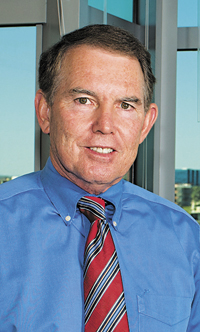 Jeffrey Trent knows that maintaining a spirit of collaboration in Arizona’s biomedical community is vital to the industry, especially in the face of severe budget cuts to organizations like TGen. He adds that while many Arizonans accurately think of TGen as a place for cutting-edge biomedical research, they may not realize that TGen also employs physicians who are treating tens of thousands of patients. He points to the case of a wheelchair-bound Phoenix girl who TGen helped to walk and talk as visible proof that the “medical miracle of genomic-based medicine is tremendously illuminating, and sparks the imagination about what is possible.”
Jeffrey Trent knows that maintaining a spirit of collaboration in Arizona’s biomedical community is vital to the industry, especially in the face of severe budget cuts to organizations like TGen. He adds that while many Arizonans accurately think of TGen as a place for cutting-edge biomedical research, they may not realize that TGen also employs physicians who are treating tens of thousands of patients. He points to the case of a wheelchair-bound Phoenix girl who TGen helped to walk and talk as visible proof that the “medical miracle of genomic-based medicine is tremendously illuminating, and sparks the imagination about what is possible.”
What is your most notable accomplishment in public policy this year?
Maintaining and enhancing a spirit of collaboration throughout Arizona’s biomedical community has been, and will continue to be, an essential hallmark of TGen research. Facing devastating budget cuts from both federal and state governments, it is more critical than ever that organizations like TGen leverage their resources in combination with other leading biomedical entities to ensure our mutual success and benefit for Arizona, and especially for our patients.
What is your top goal for the next 12 months?
Continuing to apply a sense of urgency to bring our discoveries to benefit patients in Arizona (local research benefiting local patients first). Also, continuing to recruit top-notch talent to Arizona.
What one quality can be the difference between success and failure as a leader?
Courage. I concur with those who have suggested that good leaders exhibit great courage by consistently addressing problems no matter where they are, what they are or who has them.
If the Legislature could grant you one request, what would it be?
Long-term continued support and commitment, especially for an independent, nonprofit institute like TGen and especially as we, and our collaborators who depend on us, continue to navigate what remains a long, slow recovery from a difficult recession. We delivered on a promise to positively benefit the Arizona economy with innovative research, increased state revenues, and on job creation that we hope to continue for many more years — but the support of Arizona government is crucial.
If you could tweet one bit of advice to Arizonans, what would it be? (in 140 characters or less.)
Participate now and help us end Alzheimer’s disease. #mindcrowd.org
What is likely to be the most innovative project TGen will be working on 10 years from now?
The delivery of genomic-guided medicine — through a method as simple as a quick blood draw — embedded within clinical settings all across the country, that allows for on-site access to the billions of bits of information contained in our genetic makeup. Our research is changing medical care to be more efficient and effective and that will begin to work itself into the everyday doctor’s office to improve individual patient care and help to reduce the cost impact to our delivery system.
Legislative
Rep. Debbie Lesko, Chairman, House Ways and Means Committee, R-Peoria
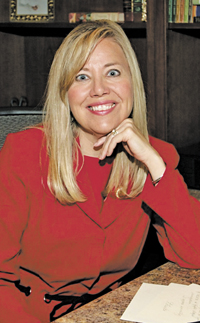 Rep. Debbie Lesko, who has represented Legislative District 21 in the Arizona Legislature for the past five years, is being recognized for her work at the Capitol this year. Her signature accomplishment was sponsoring and shepherding a bill through the House that streamlines several aspects of Arizona’s complicated transaction privilege tax system, bringing closure to an issue that had lingered for nearly two decades.
Rep. Debbie Lesko, who has represented Legislative District 21 in the Arizona Legislature for the past five years, is being recognized for her work at the Capitol this year. Her signature accomplishment was sponsoring and shepherding a bill through the House that streamlines several aspects of Arizona’s complicated transaction privilege tax system, bringing closure to an issue that had lingered for nearly two decades.
What is your most notable accomplishment in the public policy this year?
Sponsorship and passage of HB2111, the sales tax reform legislation. After 30 years of trying, we finally got it done!
What is your top goal for the next 12 months?
Sponsor and support legislation that improves Arizona and helps my constituents.
What one quality can be the difference between success and failure as a leader?
Persistence.
What would Arizona miss most if you moved to another state?
I like my constituents and they like me. I have known some of them for over 15 years. I would miss working and meeting with them and I hope they would feel the same about me.
If the Legislature could grant you one request, what would it be?
That a majority would vote yes on my legislation, of course!
Who do you trust most for advice?
People who tell the truth and who are the most knowledgeable about the subject being discussed.
Who has had the biggest impact on your development as a leader?
The people that live in my district. I really enjoy working with them.
If you could tweet one bit of advice to Arizonans, what would it be? (in 140 characters or less.)
Do what you love, help others, have faith in God and be happy.
TPT reform had been tried several times before and failed. What was the key to success this time?
The support of the governor, the hard work done by a huge coalition of supporters, and persistence by the governor, me and a core group of supporters.
What was the most crucial moment in your work with stakeholders and other lawmakers to get the bill through?
On the last day of session, we reached an agreement with the League of Arizona Cities and Towns and they dropped their opposition to my sales tax reform legislation. With this agreement, my legislation passed out of the Legislature with only one no vote.
Lifetime Achievement
Herb Guenther, Former Director, Arizona Department of Water Resources
 Herb Guenther has spent more than four decades working on water issues in Arizona. During his career, he has tackled natural resources issues from the federal, state and local levels. Guenther, who eschews seeing issues through a partisan lens, keeps his public policy focus on solving problems for the state and its residents as a whole. Looking back on his career, he hangs his hat on successful legislation associated with inter-state water transfers, intra-state water transfers, streambed ownership and the seven-state 2007 Colorado River Operational Guidelines Agreement.
Herb Guenther has spent more than four decades working on water issues in Arizona. During his career, he has tackled natural resources issues from the federal, state and local levels. Guenther, who eschews seeing issues through a partisan lens, keeps his public policy focus on solving problems for the state and its residents as a whole. Looking back on his career, he hangs his hat on successful legislation associated with inter-state water transfers, intra-state water transfers, streambed ownership and the seven-state 2007 Colorado River Operational Guidelines Agreement.
What is your most notable accomplishment in public policy this year?
Working with the Arizona Legislature on proposed water legislation and speaking to young leadership groups to share my experience dealing with Western water and natural resources.
What is your top goal for the next 12 months?
To continue to consult on water issues and share my experience with potential future leaders.
What one quality can be the difference between success and failure as a leader?
Working to find compromise on issues without caring who gets the credit.
How long have you been working in this field?
I have been in this field for 43 years. This includes 10 years with the U.S. Bureau of Reclamation, 22 years with the Wellton Mohawk Irrigation and Drainage District, seven years in the state House of Representatives, four years in the state Senate and eight years as the director of the Department of Water Resources.
What would Arizona miss most if you moved to another state?
My sense of humor and my knowledge of Western water and natural resources.
If the Legislature could grant you one request, what would it be?
Stop the partisan bickering and pass legislation that is in the best interest of the future of Arizona. I don’t understand how you can hate someone that you do not know just because of their party affiliation. I never knew whether I was a Democrat or a Republican or other and I still don’t and I don’t care. What I do care about is solving problems.
Who has had the biggest impact on your development as a leader?
No one person stands out. Many distinguished leaders have guided me and given me advice, but most of all they impressed me by their example of how to lead. I have been very fortunate to have known many exceptional leaders at the local, state and federal levels. I also look to personal acquaintances for moral guidance and a purpose driven critique.
What will it take for the Legislature to pass a comprehensive water management bill in 2014?
It is already too late to pass a water management bill in the 2014 legislative session. Because water legislation is such a sensitive issue involving many parties, it usually takes multiple years to get the majority of the parties comfortable with the legislation and lay the groundwork with both houses of the Legislature and the governor to assure success.
Natural Resources & Water
Sen. Gail Griffin, Chariman, Senate Government & Environment Committee, Vice-Chairman, Senate Natural Resources & Rural Affairs Committee, R-Hereford
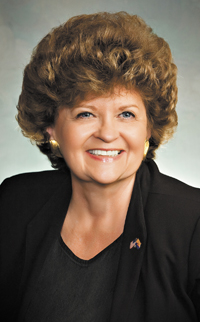 Sen. Gail Griffin, R-Hereford is being recognized for her work this year as advocate for rural Arizona, including her work serving as chairman of the Senate Government & Environment Committee and as vice-chairman of the Senate Natural Resources & Rural Affairs Committee. Griffin advocates for federal government land inside the state to be turned over to local control.
Sen. Gail Griffin, R-Hereford is being recognized for her work this year as advocate for rural Arizona, including her work serving as chairman of the Senate Government & Environment Committee and as vice-chairman of the Senate Natural Resources & Rural Affairs Committee. Griffin advocates for federal government land inside the state to be turned over to local control.
What is your most notable accomplishment in public policy this year?
My proudest legislative accomplishment this session was passing 18 bills/resolutions into law that strengthen our economy, protect rural Arizona and stand up to the federal government.
What is your top goal for the next 12 months?
I have three priorities: Protect the interests of rural Arizona, including its water and property rights, serve as an advocate for common-sense utilization of our state’s abundant natural resources, and combat federal environmental regulations that destroy jobs and harm our economy.
What one quality can be the difference between success and failure as a leader?
Transparency and communication make the difference between success and failure.
How long have you been working in this field?
This is my seventh year at the Legislature – three years in the Senate (2010-2013) and four years in the House of Representatives (1997-2001).
What would Arizona miss most if you moved to another state?
Arizona would miss a strong advocate for the interests of rural Arizona – one who recognizes that the biggest threat to our economy doesn’t come from Asia or Russia, but from Washington D.C.
If the Legislature could grant you one request, what would it be?
If Congress and the Legislature were to grant Arizona the authority to manage our forests and BLM lands.
Who do you trust most for advice?
My constituents.
Who has had the biggest impact on your development as a leader?
The support and understanding of my husband.
If you could tweet one bit of advice to Arizonans, what would it be? (in 140 characters or less.)
Stay involved in the process; after all, it’s the people’s government.
What is the most significant challenge involving natural resources faced by Arizona’s rural communities?
One of the most significant challenges involving our natural resources in Arizona is the government’s ownership/control of land. Less than 13 percent of land in Arizona is privately owned.
As chairman of the Senate Government & Environment Committee, your job is not only to push good bills, but also to stop bad bills. What was the worst bill you stopped this year?
(SB1248) Voter registration; same day.
Open Government
Ken Bennett, Arizona Secretary of State
 Secretary of State, Ken Bennett’s chief responsibility is to ensure that elections in Arizona are conducted in a fair, accurate and efficient manner. Part of his job is also providing information about those elections to the public and, many times, to journalists. He says while there are legitimate confidentiality issues regarding some personnel and legal matters, generally, transparency is the best policy. He adds, “Sometimes, the danger is information they don’t request that would complete the overall picture of what happened.”
Secretary of State, Ken Bennett’s chief responsibility is to ensure that elections in Arizona are conducted in a fair, accurate and efficient manner. Part of his job is also providing information about those elections to the public and, many times, to journalists. He says while there are legitimate confidentiality issues regarding some personnel and legal matters, generally, transparency is the best policy. He adds, “Sometimes, the danger is information they don’t request that would complete the overall picture of what happened.”
What is your most notable accomplishment in public policy this year?
Unanimous support from all 15 county recorders (8-Ds, 7-Rs) on key legislation to improve Arizona elections.
What is your top goal for the next 12 months?
A smooth, well-run statewide election in 2014.
How long have you been working in this field?
Secretary of state, five years; overall public service, 25 years; private sector, 29 years.
What would Arizona miss most if you moved to another state?
My wife.
If the Legislature could grant you one request, what would it be?
Appropriate $2 per registered voter every year. With a similar commitment in each county, Arizona would have the best election system in the country.
Who do you trust most for advice?
My children and my senior staff.
Who has had the biggest impact on your development as a leader?
My parents, my Boy Scoutmaster, and a couple of high school teachers.
If you could tweet one bit of advice to Arizonans, what would it be? (in 140 characters or less.)
Put God and family first. Do something to help another person every day. Don’t believe everything you read or hear.
What is the biggest challenge you face in ensuring that people have the information they need?
Making it easily findable, understandable and usable from their perspective.
Which job has been more challenging: Senate president or secretary of state? Why?
Senate president because there are 29 other senators who think their ideas are as good as yours. Then, whatever you do has to be identical with what both the House and the governor want, too.
Public Safety
Sheila Polk, Yavapai County Attorney
 Sheila Polk’s signature public policy accomplishment this year was obtaining a permanent injunction banning the sale of synthetic drugs and all their mutations, including bath salts and Spice, in Yavapai County. The law was supported by community members, hospitals, mental health care professionals, law enforcement officers, schools, probation officers and the DEA, who filed affidavits detailing the harm caused in the community by the illicit substances.
Sheila Polk’s signature public policy accomplishment this year was obtaining a permanent injunction banning the sale of synthetic drugs and all their mutations, including bath salts and Spice, in Yavapai County. The law was supported by community members, hospitals, mental health care professionals, law enforcement officers, schools, probation officers and the DEA, who filed affidavits detailing the harm caused in the community by the illicit substances.
What is your most notable accomplishment in public policy this year?
Working with a wonderful team, I successfully sought and obtained under Arizona’s public nuisance law a permanent injunction against all known retailers and landlords banning the sale of synthetic drugs in all their mutations in Yavapai County. The request was supported by over 100 affidavits from community members, hospitals, mental health care professionals, law enforcement officers, schools, probation officers and DEA agents detailing the harm, devastation, effects on the users, and loss of life caused by these drugs.
What is your top goal for the next 12 months?
My goal is to maintain the high quality of life in Yavapai County and for Arizona’s residents through proactive strategies that include speedy, appropriate consequences for criminal conduct and through collaboration with all sectors of our communities. And of course, world peace.
What one quality can be the difference between success and failure as a leader?
Leaders need to listen carefully and include others to achieve successful solutions to problems. Leaders who believe they have all the answers are doomed to fail.
How long have you been working in this field?
I have been in public service with a prosecuting office for the last 30 years.
If the Legislature could grant you one request, what would it be?
Take the necessary steps to repeal Arizona’s medical marijuana law. Marijuana is an addictive, harmful substance that jeopardizes a young person’s chances of success in school and in life. And the movement to ease restrictions on marijuana both increases teens’ access to it and influences their perception that it is safe.
Who do you trust most for advice?
I rely heavily on the team of supervising attorneys and managers in my office for advice and direction. They are a group of incredibly bright, dedicated and creative individuals who are in the trenches day after day and who pull no punches with me.
Who has had the biggest impact on your development as a leader?
It is not who, but rather what. The “Lessons from the Holocaust” training by the United States Holocaust Memorial Museum has profoundly impacted my development as a law enforcement and community leader.
If you could tweet one bit of advice to Arizonans, what would it be? (in 140 characters or less.)
Put your family first. Work will always be there; family will not. Time is the foundation of healthy children and is the bedrock of all relationships.
Technology
Freeport-McMoran Technology Center
 The Freeport-McMoRan Copper & Gold Technology Center is being recognized for its work on developing and advancing several processes which allow the company to get more out of the ore it mines; extract it in an environmentally sound manner and use less power and other resources to do so.
The Freeport-McMoRan Copper & Gold Technology Center is being recognized for its work on developing and advancing several processes which allow the company to get more out of the ore it mines; extract it in an environmentally sound manner and use less power and other resources to do so.
What is the center’s most notable accomplishment in public policy this year?
As a consequence of applying patented Alternative Anode technology at several Freeport-McMoRan Copper & Gold operations, the company has significantly reduced the power required to plate (electrowin) copper
What is the center’s top goal for the next 12 months?
The top goal for Technology Center is to help our mining operations enhance both product quality and process productivity through the implementation of technology. Meeting this goal will ensure that copper will be extracted in a safe and environmentally sound manner and conserve our natural resources.
What one quality can be the difference between success and failure as a leader?
The success of an organization is dependent on having a clear vision of what is to be accomplished and dedicated employees who are driven to achieve that vision.
How long has the organization been working in this field?
Freeport-McMoRan Copper & Gold has been committed to applying best available technology from its inception decades ago.
If the Legislature could grant you one request, what would it be?
Continue to allow us to operate in a cooperative and productive manner so that both company and state benefit from the relationship.
What is the most recent improvement in Freeport’s Arizona mining operations based on methods taught at Freeport’s Technology Center?
The Technology Center has, through its combined efforts with Arizona operations, harnessed beneficial, naturally-occurring microbes to accelerate the extraction of copper. As a result, less water, energy and resources need to be applied to recover copper from primary sulfides.
What is the top project or process the center is working on right now?
Most of the easily-extractable copper ore on the planet has been mined and processed. As a result, recovering the next pounds of copper require more resourceful methods in order to be economically viable. We are developing a technology to economically recover copper from high-processing-cost ores that do not lend themselves to conventional acid leaching. The process that we are developing and patenting will allow us to turn a specific category of costly copper-bearing waste into financially-viable ore.
— Responses provided by Rick Gilbert, vice president of technology, Freeport-McMoRan Copper & Gold
Transportation
Rep. Karen Fann, Chairman, House Transportation Committee, R-Prescott
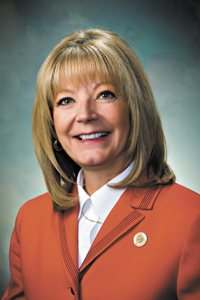 As chairman of the House Transportation Committee, Rep. Karen Fann sees many important transportation- and infrastructure-related bills pass across her desk. She believes that “superior, safe and uncongested highways” are a key to strong economic development in Arizona. She says the most significant bill she sponsored this year – HB2170 – requires school bus operators to display their stop signs and lights on both public and private roads, to increase safety for kids getting off or on the bus. She introduced the bill after hearing the story about the tragic death of an 8-year-old girl.
As chairman of the House Transportation Committee, Rep. Karen Fann sees many important transportation- and infrastructure-related bills pass across her desk. She believes that “superior, safe and uncongested highways” are a key to strong economic development in Arizona. She says the most significant bill she sponsored this year – HB2170 – requires school bus operators to display their stop signs and lights on both public and private roads, to increase safety for kids getting off or on the bus. She introduced the bill after hearing the story about the tragic death of an 8-year-old girl.
What is your most notable accomplishment in public policy this year?
While there were many great legislative bills passed this year, the construction sales tax reform bill was the most challenging and rewarding.
What is your top goal for the next 12 months?
My top goal is unchanging. We need to continue increasing a strong economic development atmosphere which creates long term job opportunities for our citizens. This includes all areas of industry, but particularly includes our infrastructure and transportation industry.
What one quality can be the difference between success and failure as a leader?
Honesty. A leader can only be a success if their colleagues and constituents respect them and their word. They may not always like the answers, but they will always respect the honesty.
How long have you been working in this field?
I am a third generation contractor and have owned my own construction company for 30 years. In addition, I have served as an elected official for 13 years and have experienced firsthand the struggles our state and municipalities face with depleting financial resources to keep up with our infrastructure needs.
What would Arizona miss most if you moved to another state?
Hopefully nothing. A good leader always works as a team and a mentor with others, providing smooth transitions if a void arises.
If the Legislature could grant you one request, what would it be?
More time to gather additional information on bills we are voting on.
Who has had the biggest impact on your development as a leader?
The list is endless because there are many who I respect and admire in their particular fields, however, ultimately I would have to say my mother and father.
What is your biggest responsibility as House Transportation chairman?
The Transportation Committee hears bills which affect public safety, transportation funding options, compliance with federal and state regulations, laws which affect businesses who transport our goods, and a plethora of other related items. Our fellow legislative members rely on the committee members to vet these bills in committee before being passed onto the other House members for a vote. As chairman, it is my responsibility to make sure the members are informed of the issues related to the bills, provide in-depth information and testimony, allow bi-partisan discussion, which ultimately should result in good legislation being passed with no unintended consequences or excessive regulations.
Unsung Hero
Jack W. Lunsford, President, The Lunsford Group
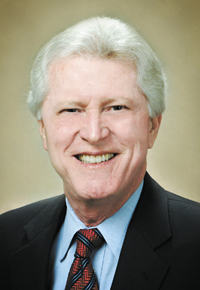 Jack Lunsford has had his hand in shaping policy in Arizona for more than 35 years. He started as Coconino County assessor in 1977, and has spent the subsequent three-plus decades involved in local, state, and national public policy issues from higher education to P-20, from transportation to property taxation, from economic development to health care. During that time, he has had direct involvement, influence, and advocacy in at least 30 Arizona legislative sessions.
Jack Lunsford has had his hand in shaping policy in Arizona for more than 35 years. He started as Coconino County assessor in 1977, and has spent the subsequent three-plus decades involved in local, state, and national public policy issues from higher education to P-20, from transportation to property taxation, from economic development to health care. During that time, he has had direct involvement, influence, and advocacy in at least 30 Arizona legislative sessions.
What is your most notable accomplishment in the public policy this year?
To reemerge from my health journey of the last four years and form The Lunsford Group; to maintain my involvement/input and to contribute to the positive outcome of Everest College Phoenix; and to continue in my board capacity with my contributions to several policy & nonprofit organizations.
What one quality can be the difference between success and failure as a leader?
To not worry about who gets the credit for your success, and to abide by The Golden Rule.
If the Legislature could grant you one request, what would it be?
The ability to compromise for the good of all Arizona through civility and respect for one another’s opinions without taking matters personally and/or being vindictive.
Who has had the biggest impact on your development as a leader?
I am blessed to have had so many – and I have learned something from each one. Particularly, though, are my up-from-the-bootstraps entrepreneurial father, Bill Lunsford, and Paul Elsner, chancellor emeritus at Maricopa Community Colleges. My father gave me guidance, and Elsner afforded me the initiative opportunities and provided the capacity to blossom and grow.
If you could tweet one bit of advice to Arizonans, what would it be? (in 140 characters or less.)
Stop polarization re immigration reform/Obamacare. Focus on civility. Coalesce/improve AZ image. Properly fund educ. Move economy frwrd. Love AZ! Peace.
What is the most poignant advice you ever received?
My father, the late Bill Lunsford, defined diplomacy for me as “letting someone have your own way.” The late Allan Price from ASU defined lobbying as “constant pressure, gently applied.” Those and The Golden Rule are part of my core.
You led WESTMARC since its inception in 1989. Ideally, what will be the chief economic driver in the West Valley 10 years down the road?
The West Valley’s transportation system will define how the West Valley evolves in the next ten years. From I-11 to light rail to commuter rail, West Valley leaders will need to coalesce on these modalities and move toward completion…If the West Valley grows by some 2 million as projected for the next 20 years, leaders need to begin planning the West Valley’s regional reliever airport now.
During your career, you have served on more than 40 boards and commissions at all levels of government and business. Are there any issues remaining that you’d like to get into that you haven’t yet?
Education and transportation infrastructure are my passions. I would like to continue my involvement and leadership in those areas to improve them for Arizona’s future, and I would like to assist however I can with immigration reform.
Up & Comer
Michael Hunter, Director of Policy and Special Advisor on Tax Policy & Reform, Governor’s Office
 Michael Hunter led the Ninth Floor’s efforts this year for Gov. Jan Brewer’s No. 2 priority, reforming the transaction privilege tax (TPT) code, also known as sales tax. Hunter, who has previously served as the Brewer’s director of legislative affairs and as senior policy adviser for budget and finance for the Arizona Senate Republican caucus, proved to be well-prepared for the task, which occasionally involved tangling with the League of Arizona Cities and Towns. Ultimately, HB2111 passed with near-unanimous support after an acrimonious, session-long fight with the cities and their allies and was signed into law in late June.
Michael Hunter led the Ninth Floor’s efforts this year for Gov. Jan Brewer’s No. 2 priority, reforming the transaction privilege tax (TPT) code, also known as sales tax. Hunter, who has previously served as the Brewer’s director of legislative affairs and as senior policy adviser for budget and finance for the Arizona Senate Republican caucus, proved to be well-prepared for the task, which occasionally involved tangling with the League of Arizona Cities and Towns. Ultimately, HB2111 passed with near-unanimous support after an acrimonious, session-long fight with the cities and their allies and was signed into law in late June.
What is your most notable accomplishment in the public policy this year?
Playing a role in Governor Brewer’s historic public policy accomplishments over the past three years, notably in the Medicaid restoration and sales tax simplification this year. It has been an honor every step of the way.
What is your top goal for the next 12 months?
I look forward to continuing to serve with Team Brewer for the next set of amazing public policy accomplishments.
What one quality can be the difference between success and failure as a leader?
Good leaders are good servants.
How long have you been working in this field?
It’s not so much the years as it is the miles.
What would Arizona miss most if you moved to another state?
State and local budgets will miss all the sales tax revenue I generate in the retail and restaurant/bar classifications.
If the Legislature could grant you one request, what would it be?
Help me help you.
Who do you trust most for advice?
My wife and my priest — in that order.
Who has had the biggest impact on your development as a leader?
The Three Thomases: Thomas the Apostle, Thomas Aquinas and Thomas Jefferson.
If you could tweet one bit of advice to Arizonans, what would it be? (in 140 characters or less.)
Be in at least good enough shape to outrun zombies.
What attracted you to a career in public service?
The privilege and opportunity to work alongside elected officials and policymakers to improve public policy in Arizona.
Since you are this year’s “Up & Comer,” which Leaders of the Year award should we look out for you to win next?
I just hope it’s not the “Down & Outer” or the “Used to Be Somebody” category.
Volunteerism
Jan Hancock, Principal, Hancock Resources
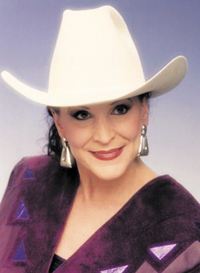 Jan Hancock’s commitment to volunteering began before she turned 13, and she says the life-long commitment continues to repeat itself in “wonderful ways.” She is a strong advocate for trails, parks and open spaces and the healthy lifestyle that they bring to communities.
Jan Hancock’s commitment to volunteering began before she turned 13, and she says the life-long commitment continues to repeat itself in “wonderful ways.” She is a strong advocate for trails, parks and open spaces and the healthy lifestyle that they bring to communities.
What is your most notable accomplishment in public policy this year?
Organizing and leading presentations at four 2013 national trails conferences that address the overwhelming economic benefits and healthy life styles that trails, parks, and open space bring to states and communities. Thousands have heard this important message in 2013.
What is your top goal for the next 12 months?
Production of a series of webinars for American Trails.org, universities nationwide, and the Bureau of Land Management to help support the importance of community recreational amenities to increase tourism, economic growth, public health, and partnerships between public and private sectors.
What one quality can be the difference between success and failure as a leader?
Listening to others…or not.
How long have you been working in this field?
Volunteerism is a life-long commitment that began in my pre-teen years and somehow continues repeating itself in wonderful ways that always, always gives me a reason to jump out of bed every morning! I want to die with my boots…and sometimes-necessary volunteer spurs…on.
What would Arizona miss most if you moved to another state?
You’ve got to be kidding…why would I ever leave Arizona? Anyway, if I ever left Arizona, my booming voice could be heard across state lines.
If the Legislature could grant you one request, what would it be?
Re-instate the Heritage Fund and never opt-out for the Federal Highway Administration funds that help communities and organizations provide recreational trails, parks and associated amenities for the urban and rural communities in Arizona. Amen.
Who do you trust most for advice?
Other leaders. And there are so many who are much, much wiser than me. Maria Baier, CEO of the Sonoran Institute and former adviser to Arizona governors, and former Arizona leader with the Trust for Public Lands and the Arizona State Land Department. Maria would definitely be one of the top people I trust for advice and counsel.
Who has had the biggest impact on your development as a leader?
My family, my friends and my peers. Gee whiz, how could we get anything done without them?
If you could tweet one bit of advice to Arizonans, what would it be? (in 140 characters or less.)
If you want to make a difference, just show up. Getting and keeping involved is every volunteer’s mantra.
Social Services/Volunteerism
Phoenix Rescue Mission
 The Phoenix Rescue Mission has been providing “Christ-centered, life-transforming solutions to persons facing hunger and homelessness,” for 60 years in the Valley. This summer, the organization used volunteers to seek out people in need and invite them into the shelter. The mission also distributed more than 300,000 bottles of water directly to the homeless and to other organizations that care for the homeless. The mission’s chief goals during the next year are adding a women’s shelter, a family shelter and expanding its existing men’s programs.
The Phoenix Rescue Mission has been providing “Christ-centered, life-transforming solutions to persons facing hunger and homelessness,” for 60 years in the Valley. This summer, the organization used volunteers to seek out people in need and invite them into the shelter. The mission also distributed more than 300,000 bottles of water directly to the homeless and to other organizations that care for the homeless. The mission’s chief goals during the next year are adding a women’s shelter, a family shelter and expanding its existing men’s programs.
What is the organization’s most notable accomplishment in public policy this year?
Red Summer Heat Relief campaign to the needs of the homeless on the streets in the summer months was extremely successful. The community joined with us in our efforts to raise and distribute bottled water to our most vulnerable citizens. This summer was the hottest summer on record and our heat relief programs played a vital role in saving lives.
What one quality can be the difference between success and failure as a leader?
Servant leadership, truly serving those in our programs and our employees. Leading by example, not only makes you a successful leader, it raises up those around you.
If the Legislature could grant the organization one request, what would it be?
The Phoenix Rescue Mission would ask the Legislature to facilitate user choice for recovery services, not restrict those that need services to programs run by the government. In essence, let’s give faith-based programs equal opportunity in the marketplace.
If you could tweet one bit of advice to Arizonans, what would it be? (in 140 characters or less.)
UR life will B 4-ever changed by volunteering — give ur time, talent and treasure & U will B blessed beyond measure #Luke6:38
What accomplishment is the organization most proud of over the past 12 months?
Our leadership team came up with a vision we called Transformation 360. The idea was that transformation should happen to everyone who comes to the mission — the homeless, the addict, the volunteer, the church group that goes out on the Hope Coach, the donor dropping off clothing — everyone should have a life-transforming experience. Now, to watch that vision become reality and see people impacted by our work — it is amazing.
What is the organization’s greatest need for the next 12 months?
The Phoenix Rescue Mission needs to grow. We need a bigger presence in the social service arena and a bigger campus to support the need. We know that if we opened a campus today, we could fill 900 beds. More physical space would allow us to better serve the community by collaborating with other agencies to solve some of the state’s human service issues such as assisting young adults who age out of the foster care system, helping victims of sex trafficking and spearheading programs that prevent homelessness.
— Responses provided by Jay Cory, president and CEO, Phoenix Rescue Mission
Social Services/Volunteerism
St. Mary’s Food Bank Alliance
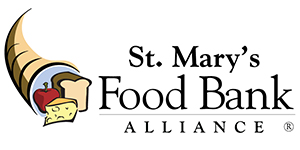 St. Mary’s Food Bank Alliance is recognized as the world’s first food bank. In following that mission, as a member of a network of more than 200 member food banks, the organization distributed almost 70 million pounds of food in fiscal year 2011 to families and individuals. Just this year, through food resourcing efforts it was able to increase the amount of fruits and vegetables it provides by 56 percent.
St. Mary’s Food Bank Alliance is recognized as the world’s first food bank. In following that mission, as a member of a network of more than 200 member food banks, the organization distributed almost 70 million pounds of food in fiscal year 2011 to families and individuals. Just this year, through food resourcing efforts it was able to increase the amount of fruits and vegetables it provides by 56 percent.
What is the organization’s most notable accomplishment in public policy this year?
As a result of recent legislation related to crop contributions, St. Mary’s has succeeded in substantially improving the nutritional quality of the food we distribute to families in need.
What is the organization’s top goal for the next 12 months?
Even with the scale and scope of St. Mary’s Food Bank Alliance, there are people in this state who are still hungry. We need to work to get more food, and more nutritious food, into every corner of Arizona. This is going to require an orchestration of resources at an unprecedented level.
How long has the organization been working in this field?
St. Mary’s was founded in 1967 and is recognized as the world’s first food bank. Today, St. Mary’s is one of the largest food banks in the country — both in terms of the amount of food we distribute annually — almost 70 million pounds last year — and the size of our service area — approximately 81,000 square miles.
What would Arizona miss most if the organization moved to another state?
We have more than 300 agency partners around the state that help us distribute food to those in need. The economic impact we have directly and through our agency partners is enormous. Without us, those food pantries, domestic violence shelters, food banks and senior centers would lose their food lifeline and would require additional resources to fulfill their missions.
Who has had the biggest impact on your development as a leader?
Our founder, John van Hengel is known for asking, “The poor we shall always have with us, but why the hungry?” Not only does he inspire us, but his likeness is represented in sister food banks around the country and the world. St. Mary’s continues to pursue a vision of a hunger-free Arizona.
How has the organization’s role in meeting people’s needs changed over the past decade?
St. Mary’s includes “self-sufficiency” in its mission for a reason. We are committed to providing good, nutritious food to those in need, but also believe we have a responsibility to find ways to shorten that very line we serve.
Is poverty becoming more of a problem or less of a problem in metro Phoenix (and why?)
From 2008 to 2010, the amount of food St. Mary’s distributed to the needy nearly doubled. Three years later, we are still distributing almost 70 million pounds annually. In metro Phoenix, the poverty levels continue to rise and we have created 30 “mobile pantry” sites in the Phoenix metro area to bring the food directly to areas most impacted by poverty.
— Responses provided by Beverly Damore, president and CEO, St. Mary’s Food Bank Alliance
Social Services/Volunteerism
St. Vincent de Paul
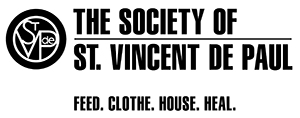 St. Vincent de Paul has been feeding, clothing, housing and healing individuals and families who have nowhere else to turn for help since 1946. The organization also provides opportunities for volunteers to “serve their neighbors in need with love and compassion.” In achieving its mission, St. Vincent de Paul partners with several other entities to extend its reach as far as possible.
St. Vincent de Paul has been feeding, clothing, housing and healing individuals and families who have nowhere else to turn for help since 1946. The organization also provides opportunities for volunteers to “serve their neighbors in need with love and compassion.” In achieving its mission, St. Vincent de Paul partners with several other entities to extend its reach as far as possible.
What is the organization’s most notable accomplishment in public policy this year?
St. Vincent de Paul is partnering with foundations, corporate partners and donors to expand resources and capacity to do an even better job of helping the poor, hungry and homeless.
What is the organization’s top goal for the next 12 months?
Our top goal for the next year is to expand services to the needy with the help of our community of volunteers.
What one quality can be the difference between success and failure as a leader?
A critical quality is for management to be able to attract the talent necessary to accomplish the mission. Anti-poverty agencies need money and volunteers, but without talented staff providing leadership and follow-through, success is not assured.
How long has the organization been working in this field?
St. Vincent de Paul is an international organization, but the Phoenix chapter has been serving central and northern Arizona since 1946.
What would Arizona miss most if the organization moved to another state?
We would miss the culture where the opportunity to do the impossible is always available. This community is determined to solve its chronic homelessness and hunger issues through coalitions of agencies, and has a very good chance of doing so.
If the Legislature could grant you one request, what would it be?
If the Legislature would fund education and human services organizations in creative ways, the future economy and quality of life in this state would rise.
Who do you trust most for advice?
Don’t trust any one person, but several people. In general, we should appreciate both subject matter experts and people of good will who want the best for others.
Who has had the biggest impact on the organization’s development as a leader?
Volunteers continue to shape and inspire St. Vincent de Paul on a daily basis. Our community has an amazing ability to rally around a cause when the need is revealed.
If you could tweet one bit of advice to Arizonans, what would it be? (in 140 characters or less.)
“Never give up on your goals. Goals keep you going and provide meaning and purpose to your life.” We use that theme each Monday morning in speaking to 700 homeless people about bettering their life situation.
Is poverty becoming more of a problem or less of a problem in metro Phoenix (and why?)
Poverty has increased through the last prolonged recession. Incomes have stagnated. Human services agencies, food banks, health care, job training have all had to get better.
— Responses provided by David Smith, chief operations officer, St. Vincent de Paul
Social Services/Volunteerism
The Salvation Army
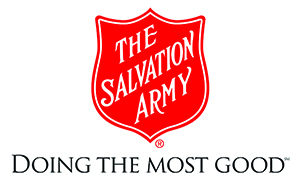 The Salvation Army opened two new facilities recently to continue its mission of “preaching the gospel of Jesus Christ while meeting human needs in His name without discrimination.” The Herberger Campus Family Shelter in central Phoenix will help combat family homelessness and the Ray and Joan Kroc Center in south Phoenix will improve educational and development opportunities for adults and children in that area.
The Salvation Army opened two new facilities recently to continue its mission of “preaching the gospel of Jesus Christ while meeting human needs in His name without discrimination.” The Herberger Campus Family Shelter in central Phoenix will help combat family homelessness and the Ray and Joan Kroc Center in south Phoenix will improve educational and development opportunities for adults and children in that area.
What is the organization’s top goal for the next 12 months?
Our goal is to focus on our efforts to end family homelessness and to transition such families to a stable living environment, to address issues relating to veterans and people needing recovery, and expand the influence and facility opportunities of the Kroc Center.
What one quality can be the difference between success and failure as a leader?
The Salvation Army is a faith-based organization. For us, we need to remain committed to our original mission while at the same time responding the various cultural and changing needs of today’s society.
How long has the organization been working in this field?
The Salvation Army has been in Arizona for 120 years since its founding in London in 1865. We are now found in 125 countries.
If the Legislature could grant you one request, what would it be?
To partner on efforts as it relates to our homeless outreach, prison/recovery services, emergency disaster efforts and other community concerns. This would strengthen what we are able to accomplish.
Who do you trust most for advice?
As a faith-based organization that is where we start. We also depend on the counsel of our advisory board, our donors and the clients we serve.
Who has had the biggest impact on the organization’s development as a leader?
We look at leadership as a spiritual and social gift. The Salvation Army’s founder, William Booth, gave us the leadership for The Salvation Army and it still applies.
If you could tweet one bit of advice to Arizonans, what would it be? (in 140 characters or less.)
“If you cannot be the light, be the mirror that reflects the light” Be true to who you are, know who is truth, and stand on that.
How has your role in meeting people’s needs changed over the past decade?
We are seeing the face of poverty change in Arizona. Where in the past The Salvation Army served individuals, we are now seeing more families. The cost of doing business has dramatically jumped, but at the same time our focus on developing new facilities and programs in areas that are needed, keep us challenged to meet those needs as they arise.
Is poverty becoming more of a problem or less of a problem in metro Phoenix (and why?)
It is more of a problem based on many things including: a changing economy, moving more toward a service oriented job market, a growing dependency on governmental assistance, the increasing cost of education, rising drop-out rate in schools, and issues related to substance addiction.
– Responses provided by Col. Joe Posillico, divisional commander, The Salvation Army, Southwest Division.



